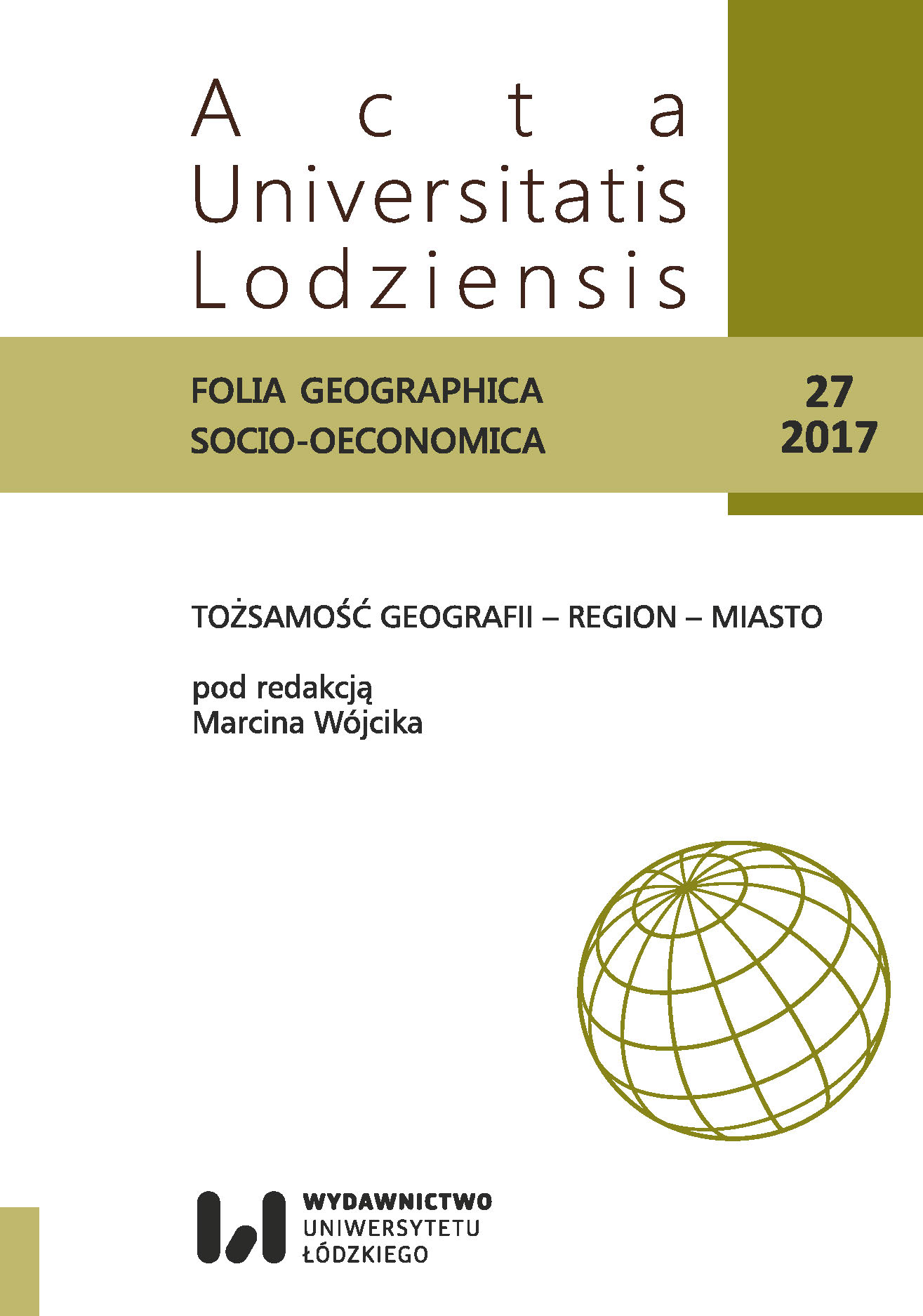Region jako istotny składnik wiedzy geograficznej w kontekście funkcji odległości
DOI:
https://doi.org/10.18778/1508-1117.27.05Słowa kluczowe:
Region, odległość, dyfuzja przestrzenna innowacjiAbstrakt
Rozważania poniższe stanowią próbę ujęcia regionu w kategoriach teorii systemów, przy wykorzystaniu wybranych elementów teorii dyfuzji przestrzennej. Analizie poddano koncepcję opartą na efekcie hierarchicznym i sąsiedztwa, które wynikają z funkcji odległości.
Bibliografia
Bahrenberg G., Łoboda J., 1973, Einige Raum – zeitliche Aspekte der Diffusion von Innovationen – an Beispiel der Ausbreitung des Fernsehens in Polen, „Geographische Zeitschrift”, 3, Wiesbaden.
Google Scholar
Bertalanffy L. von, 1951, Problems of general sytem theory, „Human Biology”, 23; tłum. pol. PZLG, 1960, z. 2.
Google Scholar
Chojnicki Z., 1966, Region w ujęciu geograficzno-systemowym, [w:] Czyż T. (red.), Podstawy regionalizacji geograficznej, Bogucki Wydawnictwo Naukowe, Poznań, s. 7–44.
Google Scholar
Domański R., 1972, Kształtowanie otwartych regionów ekonomicznych, Warszawa.
Google Scholar
Domański R., 2008, Modele ewolucji przestrzennego zagospodarowania: zjawiska, koncepcje, modele, [w:] Parysek J., Stryjakiewicz T. (red.), Region społeczno-ekonomiczny i rozwój regionalny, Bogucki Wydawnictwo Naukowe, Poznań, s. 27–75.
Google Scholar
Dutkowski M., 2008, Mówiąc „region”, [w:] Parysek J.J., Stryjakiewicz T. (red.), Region ekonomiczny i rozwój regionalny, Bogucki Wydawnictwo Naukowe, Poznań, s. 369– 387.
Google Scholar
Isard W., 1959, General theory: social, political, economic and regional, Mass. T.T. Press, Cambridge.
Google Scholar
Łoboda J., 1979, Region as a system, [w:] Kukliński A., Kultalahti O., Koskiaho B. (red.), Regional Dynamics of Socio-economic Change, Finnpublishers, Tampere.
Google Scholar
Łoboda J., 1983, Rozwój koncepcji i modeli przestrzennej dyfuzji innowacji, „Acta Universitatis Wratislaviensis”, 585, Studia Geograficzne 37, Wrocław.
Google Scholar
Mierzejewska L., 2003, Rozwój zrównoważony jako kategoria ładu przestrzennego, „Biuletyn KPZK PAN”, 205, Warszawa, s. 127–140.
Google Scholar
Palka Z., Ratajczak W., Welterowska J., 2001, Wyznaczanie odległości między grafami, [w:] Rogacki H. (red.), Koncepcje teoretyczne i metody badań geografii społeczno-ekonomicznej i gospodarki przestrzennej, Bogucki Wydawnictwo Naukowe, Poznań, s. 147–158.
Google Scholar
Rapaport A., 1973, Zastosowanie izomorfizmów matematycznych w ogólnej teorii systemów, „Prakseologia”, 2 (46).
Google Scholar
Ratajczak W., 2008, Innowacyjność a konkurencyjność polskich regionów, [w:] Parysek J.J., Stryjakiewicz T. (red.), Region ekonomiczny i rozwój regionalny, Bogucki Wydawnictwo Naukowe, Poznań.
Google Scholar
Rykiel Z., 2004, Region a chaos percepcyjny, [w:] Michalski T. (red.), Region i edukacja regionalna – zarys problematyki, Wydawnictwo Diecezji Pelplińskiej, Bernardinum, Pelplin.
Google Scholar
Steiner M., Mandale C., 1988, Region and Regionalism in the United States. A Source Book for the Humanities and Social Sciences, Garland Publishing, Inc. New York and London.
Google Scholar
Szajnowska A., 1977, O koncepcji systemowej w badaniach geograficznych, „Czasopismo Geograficzne”, 48 (1).
Google Scholar
Zipser T., 1972, Modele symulacyjne wzrostu miast oparte na modelu procesu wyboru celów, „Przegląd Geograficzny”, 44 (3).
Google Scholar








